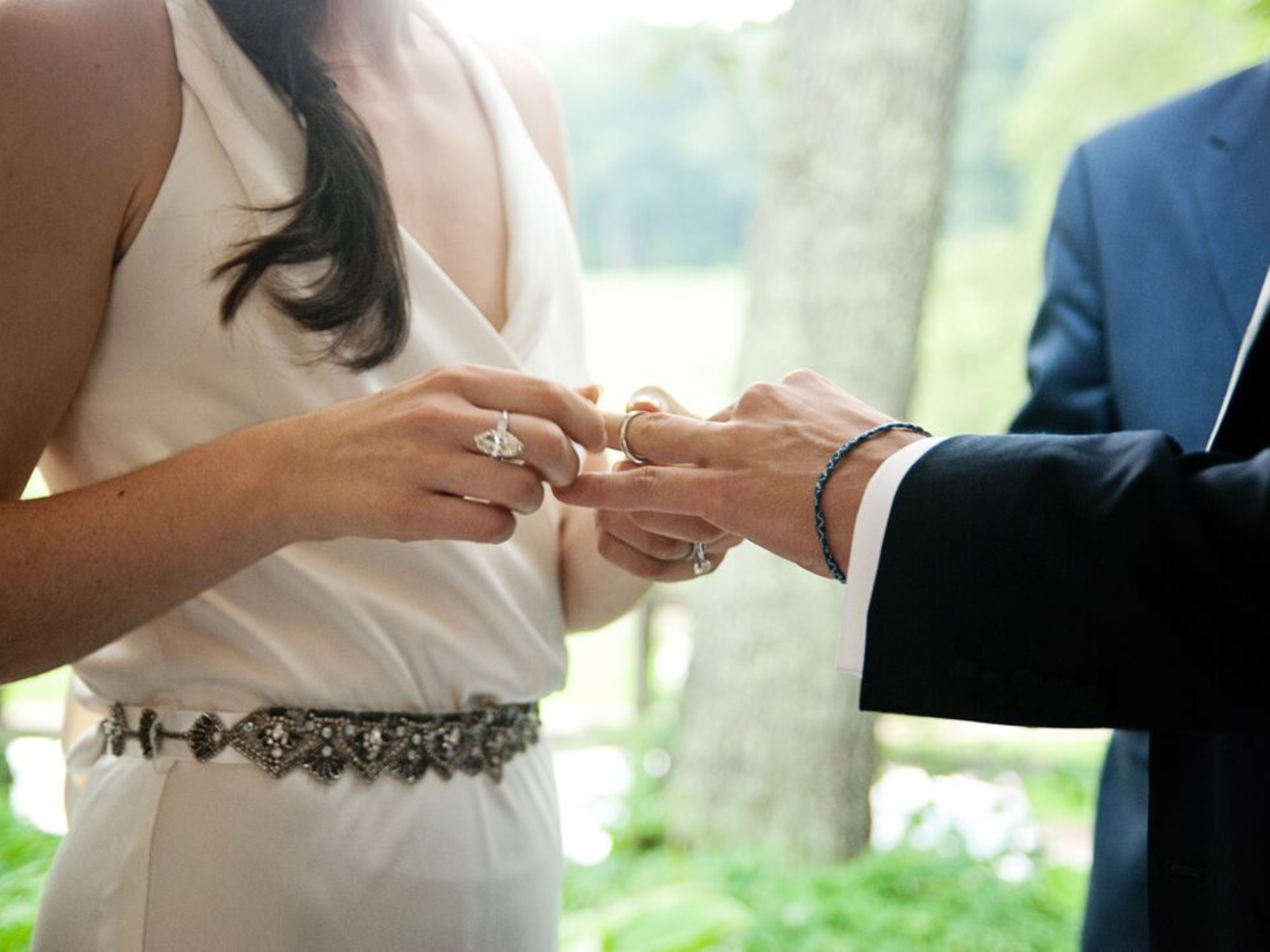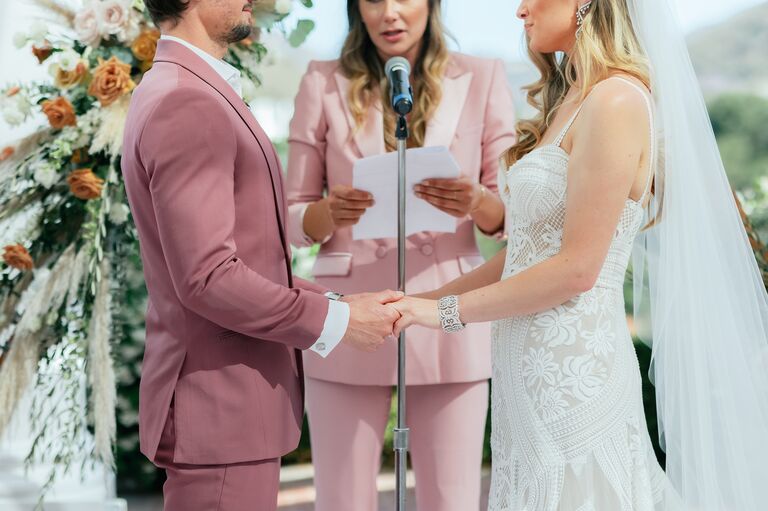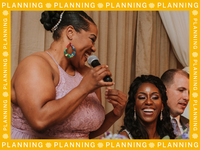Can Anyone Officiate a Wedding? Here's the Tea
There are many details that make a wedding ceremony special: the music, the decor, the venue itself. Another element that makes a huge impact is the person who performs the ceremony. One question that will likely come up as you're selecting who will marry you is: Can anyone officiate a wedding? For instance, can a notary marry someone or perhaps a ship captain? And more specifically, can a friend or family member serve as the officiant? There are some ins and outs of who can marry you depending on different factors. Read to learn more about the specifics of who officiate a wedding, including who can marry you outside of a house of worship.
In this article:
- Who Can Legally Marry a Couple?
- Do You Need To Be Ordained to Marry Someone?
- If You Are Ordained, Can You Marry a Couple in Any State?
- Can Your Friends or Family Officiate Your Wedding?
- Having Your Friends Officiate Your Wedding: What to Know
Who Can Legally Marry a Couple?
"The types of people who can legally marry a couple are religious, civil, ordained, licensed ministers who have an active ministry in addition to performing marriages, judges, magistrates, justices of the peace, licensed celebrants and in some states, notaries," says Orsella Hughes of Serenity Ceremonies by Rev. Orsella. "In all cases, it is always best to confirm qualifications with both the state and local jurisdictions where the ceremony will take place to ensure someone can legally marry a couple." Keep reading for more specifics on who can officiate a wedding.
Licensed Minister/Religious Officiant
Yup! A licensed minister can perform weddings. "Some states require proof of licensing and, in some cases, even registering with the town clerk where the wedding is taking place," Hughes notes.
And if you're wondering: can an ordained minister marry someone in any state? The answer is also yes. However, there's one thing to remember. "Whether the officiant's ordination is religious or civil through an online accredited program, the local town jurisdiction has the final say on whether or not they can legally perform a ceremony in the state where the wedding is taking place," Hughes says.
Justice Of The Peace
A couple can also opt to have a justice of the peace perform their wedding. However, there are some caveats as to whether a justice of the peace can marry you anywhere. "In many states, residency is required in order to legally marry a couple," Hughes says. "Justices of the peace credentials are typically for the state where they reside. Checking with the local town clerk where the wedding will take place is always the best resource to confirm any questions."
Notary
According to Hughes, some states allow a notary to add wedding officiant to their credentials. However, it is only sometimes accepted. So if you're looking to have a notary officiate your wedding, she recommends checking your state laws and the local jurisdiction of where the ceremony to take place to ensure the notary can legally perform the ceremony.
Ship Captain
So can a ship captain marry you? Hughes says yes, but they must be an ordained or licensed minister, justice of the peace, or a judge to be able to legally perform a wedding ceremony.
Chaplain
Similarly, Hughes says a chaplain can legally marry a couple, but only if they are ordained or licensed ministers or have credentials as a justice of the peace, magistrate, or judge.
Do You Need To Be Ordained to Marry Someone?
Nope! "Judges, magistrates, justices of the peace, licensed celebrants and in some states, notaries can legally marry a couple," Hughes says. You can, of course, also opt to hire a professional officiant to marry you. Pro tip: The Knot Vendor Marketplace is an excellent resource for finding vendors.



If You Are Ordained, Can You Marry a Couple in Any State?
Yes! However, there are some things to keep in mind. "Whether the officiant's ordination is religious or civil through an online accredited program, the state and local town jurisdiction has the final say on whether or not they can legally perform a ceremony in the state where the wedding is taking place," Hughes says.
Can Your Friends or Family Officiate Your Wedding?
So can anyone marry a couple? And more specifically, can anyone get ordained, such as a friend or family member? Yes again. However, Hughes says they must have all the state and local officiating requirements before the wedding ceremony.
"Family and friends can only officiate a wedding if they are a religious, civil, ordained, licensed minister, judge, magistrate, justice of the peace, or licensed celebrant," she says.
Getting ordained to perform a wedding is the most common route when having a friend officiate your wedding. To do so, Hughes says they can use online ordination options to sign up to become legally eligible to perform marriages. She adds that ensuring that the state and local town jurisdiction allows online ordained officiants to perform ceremonies in their state is essential. "The legal requirements to officiate a wedding are always available on the state and local town clerk's websites for where the ceremony will take place," she says. "It is important to research where the ceremony will take place and not the residence of the couple or the officiant."
Having Your Friends Officiate Your Wedding: What to Know
If you and your partner have asked a friend or family member to officiate your wedding, here are the top things to remember.
Review legal requirements.
First and foremost, ensure you research the requirements to officiate a wedding, including the logistics of getting a marriage license. "Both you and your family/friend are new to the wedding ceremony process; therefore, taking the extra effort to make sure all of the legal requirements are in place ahead of the wedding ceremony is a benefit for everyone involved," Hughes says. "Additionally, it is the legal responsibility of the wedding officiant to return the marriage license in the envelope provided by the town hall within the days specified by their laws."
Ensure comfort with public speaking.
Whoever you choose to officiate your wedding must be comfortable speaking in front of an audience. "Your ceremony is the first event of your wedding day and sets the tone for the rest of your day, and this is not the time for the officiant to have stage fright," Hughes says. For this reason, she recommends asking them to rehearse the ceremony at least three months in advance to avoid reading a script word for word. Also, she suggests having them at the rehearsal to ensure they feel comfortable in the ceremony space before the big day.
Set expectations.
From the onset, Hughes emphasizes the importance of setting expectations for the friend or family member who will officiate your wedding. "Too often, couples fall for the 'the officiant just stands there and talks' description and that couldn't be further from the truth," she says. "Be sure you provide them with all of your wedding ceremony expectations, including readings, vows, prayers, music, etc. This eliminates any possibility of assuming they would already know your desires and expectations."





















